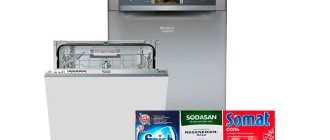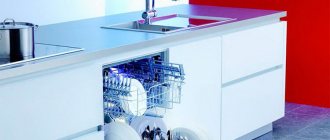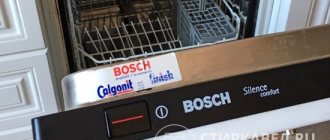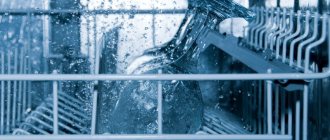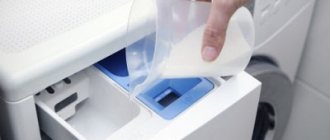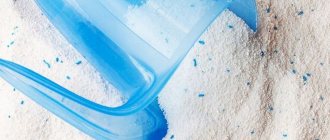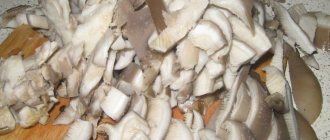All water flowing in pipes and from the tap contains calcium and magnesium. The higher the concentration of these salts in water, the harder it is considered. If such water is used to wash dishes in a dishwasher, then scale will begin to appear on individual elements of the device over time, which can subsequently lead to failure of the machine.
To prevent this, manufacturers of such devices equip dishwashers with ion exchangers. These devices contain a resin that attracts calcium and then eliminates it. However, to regenerate the resin, sodium chloride is needed, which is the main component in dishwasher salts.
Salt for dishwashers not only prolongs the life of the device, but also helps to better clean the dishes from dirt, since after washing there are no streaks or stains left on the mugs and plates.
What does salt contain?
Many people may think that dishwasher salt is almost the same as regular table salt, but this is not the case. First, dishwasher salt comes in larger granules. Secondly, such salt undergoes thorough purification, after which it simply cannot contain any impurities.
In addition, depending on the manufacturer, it can be made with the addition of the following components:
- Sodium citrate (serves to destroy germs and bacteria);
- Sodium percarbonate;
- Various flavoring agents;
- Sodium disilicate and bicarbonate;
- Sodium polyaspartate.
The above substances give the products of individual manufacturers distinctive properties. For example, some variations give water antibacterial properties or imbue it with a pleasant aroma.
How to replace a special salt product
The main component of special salt granules or tablets is sodium chloride, i.e. ordinary table salt - they contain about 99%. In principle, you can replace the special substance with table salt from the store. The best option for this would be the “Extra” variety - this variety is considered the purest. But you should know that dishwasher manufacturers categorically do not recommend replacing special components with food grade ones.
The fact is that table salt usually contains various impurities that negatively affect the performance of the PMM. Of course, it will not fail immediately, but its service life may be greatly reduced. In addition, special salt products, in addition to sodium chloride, usually include additional beneficial substances - these can be antibacterial additives and flavorings.
How to choose dishwasher salt
Today, a large number of different salts for dishwashers are produced. Thanks to this, each owner of such a device can choose a product that will have the optimal cost and composition. Most often, dishwasher salt is sold in granules, packaged in cardboard boxes or plastic bags.
dishwasher salt
This product is produced by almost all leading manufacturers of dishwasher detergents, which are suitable for all popular brands of PMM (Electrolux, Bosch, Siemens, etc.).
The drug is produced by the following brands:
- Clean and Fresh;
- Gut and Gunting;
- Elly;
- Finish;
- Kraft et al.
Some brands produce dishwasher salt in large tablets.
salt tablets
The following brands produce such drugs:
- Dr.Prakti;
- Frau Schmidt;
- Lotta;
- Topper et al.
Some dishwasher owners want to save money and, instead of special dishwasher salt, pour regular table salt into the device. It is strictly forbidden to pour it in, since over time the ion exchanger will begin to become clogged with impurities contained in ordinary salt, which will lead to breakdown of the device.
What is it for?
Tap water used for washing dishes contains impurities. These are substances that change the properties of a liquid under certain conditions, for example, due to heating. As a result, scale forms on some parts (heating element, tube walls).
The content of dissolved calcium and magnesium compounds leads to such consequences. When exposed to high temperatures, they settle on surfaces, where they gradually harden.
It is impossible to remove plaque in the usual way. It is necessary to use aggressive cleaning agents (acid-based), but even these do not always solve the problem. You will have to contact the service center. In the most severe cases, the elements of the mechanism are replaced.
If you use salt, your equipment will be maintained unnoticed. At the same time, it is poured inside the mechanism, for which a special compartment is provided.
Be sure to add dishwasher salt from time to time. But the peculiarities of using the substance are taken into account: its unrestricted use in violation of the rules is unacceptable.
How does water hardness affect salt consumption?
As mentioned above, the harder the water, the more salt is needed to clean it. To independently determine the hardness of water, there are 3 ways:
- Approximately. In this case, you need to take a piece of ordinary laundry soap and soap a piece of fabric with it. If a piece of fabric practically does not lather, then the water has a high level of hardness.
- By observation. You can also observe the plumbing elements that are constantly in contact with water, for example, the faucet. If plaque quickly appears on it, then the water is hard.
- T eats stripes. This way to find out water hardness is the fastest and most accurate. You just need to dip the strip in water, after which you can tell the water hardness by the color of the strip. The color can vary from light blue to dark blue. The lighter it is, the less hard the water.
water hardness test strips
Application options
The degree of hardness of the water in the tap helps determine which type to use for kitchen work. For this purpose, the standard normal operating mode is set. Hardness can be understood by assessing when to add another portion. This indicator is determined using a special test strip.
As a result, depending on the degree of rigidity, a choice is made:
- Tablets for areas with soft levels.
- For medium hardness, you can use both tablets and the affordable “Extra”.
- In areas with hard water, the use of coarse granular salt is recommended.
The use of such a tool is important in any case. It is difficult to overestimate why salt is needed in the dishwasher.
Its use increases the service life of household appliances and the quality of dishwashing. It is important to remember that the more expensive the chosen product, the more degrees of purification it has gone through. As a result, a seemingly expensive product will provide additional savings, ensuring a long service life for expensive kitchen equipment.
How much salt to add
How much salt should I put in the dishwasher? Many people ask this question. Manufacturers advise filling the compartment to the top - it usually holds 0.8 - 1.2 kg of the drug.
How often do you put salt in the dishwasher? Dishwasher owners assure that one full filling of the dishwasher with salt is enough for about 1-2 months (including daily use).
You need to add a new portion of salt only when the corresponding indicator lights up on the dishwasher display, indicating that there is no salt in the ion exchanger.
salt indicator on the PMM panel
The rate of salt consumption is directly affected by the level of water hardness. The easiest way to find out this level is to contact the utility company, but you can also use the above methods.
Rating of brands and manufacturers
Almost every manufacturer of dishwashers also produces salt and detergent compositions for them, or recommends directly in the instructions for the machine to use a salt version of a particular brand with a specific dosage.
Prices for sold salt formulations vary little by brand - if saving money is not a priority, then it is best to purchase branded preparations recommended by the manufacturer of the dishwashing equipment in the kitchen
It is difficult to create a comprehensive rating of dishwasher salts, taking into account many different parameters. A similar composition is almost pure sodium chloride (usually the mass fraction of NaCl in them is 99.5–99.7%!). Inventing something special here is problematic.
According to the standards, the product in question should not contain additives, rinsing aids, impurities or detergents. If anything similar is included in the description of the composition, then this is not an active salt for the ion exchanger, but a regular dishwashing detergent in an automatic dishwasher such as “3 in 1”, “5 in 1”, “ALL in 1”, etc. . Such tablets and powders are placed in a completely different compartment in the dishwasher.
The best option for regenerating salt is large NaCl crystals. The finely ground powdered analogue is used up too quickly; it is better to avoid it in the store. You need to look for a salt product in the form of granules with a minimum size of 4–6 mm. Tablets are also good in this regard, but not every ion exchanger can contain them simultaneously in the required quantity.
1st place – Finish Calgonit
First place was given to Finish Calgonit due to the almost complete absence of negative reviews from housewives for products under this brand. In terms of cost, this salt is in the middle price segment.
Finish Calgonit is distinguished by high quality NaCl purification and large granules, whose characteristics are more consistent with premium products
This manufacturer also has products designed for washing dishes. We talked more about the brand's products in this material.
2nd place – Sodasan
Sodasan is as good as Finish Calgonite in sodium chloride purity, but costs a little more.
The salt consumption for the Somat PMM is a little higher, and in price it is practically not inferior to the first two competitors
We recommend: Cleaning collectible coins at home from blackness and green deposits
Final third place - Somat is a classic middling player.
In addition to salt, this manufacturer's product range includes highly effective tablet dishwashing detergents.
4th place – Eonite
Under the Eonit brand, there are two types of anti-scale salts on the market: regenerating NATURAL and CLEANVON.
The first product is positioned as made from natural raw materials, and the second – with 99.9% purification! But the naturalness of NaCl is a big question.
If the dishwasher is used frequently and a lot of dishes are washed, then this is a great option. However, if you use the dishwasher infrequently, it is better to take a cheaper anti-scale product
In all cases, you will have to pay about 100–250 rubles for a 1.5 kg pack of salt. The price depends on the region, the seller and discount promotions.
If a cheaper product is offered under a different brand with a cost below 100 rubles, then you should take it with caution. Cheapness here is the first sign of too small granules or low purity of sodium chloride. As a result, you will pay less for salt, but it will quickly be used up or cause damage to the washing machine.
Where to sleep
Before you turn on your new dishwasher for the first time, you need to thoroughly read the instructions that come with the unit. There, the new owner of the dishwasher will be able to find technical specifications, as well as operating devices.
Under the lid: a container where you need to add salt for dishwashers.
The salt compartment in most dishwashers is located under the dish compartment.
For example, this arrangement can be found in models from Bosh, Electrolux or Siemens. Once the compartment is open, you will need to unscrew the plastic cover and then pour salt into the holes. At the end of the procedure, the lid is screwed back on.
Tips for using salt
Some people make a number of mistakes when using dishwasher salt.
To avoid them, experts have identified a few simple tips that will help make dishes cleaner and also extend the life of the dishwasher:
- If your dishwasher has the ability to select water hardness, then you need to set the appropriate value. Some people do not pay attention to this function and set the value “to hell”, because they are simply too lazy to find out the hardness of the water they use. This leads to the appearance of scale on some parts of the dishwasher and impairs the cleaning of dishes;
- You only need to add salt when the corresponding indicator lights up. It is strongly not recommended to pour the product into the dishwasher;
- Do not pour regular detergent into the salt reservoir. This will lead to failure of the ion exchanger, the repair of which costs considerable money.
